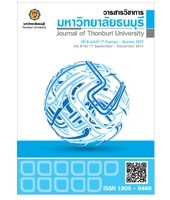ปัจจัยทางจิตสังคมที่เกี่ยวข้องกับพฤติกรรมการเรียนรู้จากประสบการณ์การฝึกงานในสถานประกอบการของนักเรียนระดับประกาศนียบัตรวิชาชีพ (ปวช.) ชั้นปีที่ 3 วิทยาลัยเทคโนโลยีหมู่บ้านครู
Keywords:
ปัจจัยทางจิตสังคม, พฤติกรรมการเรียนรู้จากประสบการณ์การฝึกงาน, การฝึกงานในสถานประกอบการ, bio-social characteristics variables, the behavior of learning work experience, job training in work placeAbstract
การวิจัยนี้มีวัตถุประสงค์เพื่อเปรียบเทียบพฤติกรรมการเรียนรู้จากประสบการณ์การฝึกงานในสถานประกอบการของนักเรียนที่มีลักษณะชีวสังคมแตกต่างกัน เพื่อศึกษาความสัมพันธ์ระหว่างปัจจัยทางจิตและปัจจัยทางสังคมกับพฤติกรรมการเรียนรู้จากประสบการณ์การฝึกงานในสถานประกอบการของนักเรียน และเพื่อค้นหาปัจจัยที่สำคัญในการทำนายพฤติกรรมการเรียนรู้จากประสบการณ์การฝึกงานในสถานประกอบการของนักเรียน โดยเป็นการวิจัยเชิงความสัมพันธ์ ประชากร คือนักเรียนระดับประกาศนียบัตรวิชาชีพ (ปวช.) ชั้นปีที่ 3 จำนวน 623 คน กลุ่มตัวอย่างจำนวน 244 คน คัดเลือกจากการสุ่มตัวอย่างแบบเชิงชั้น ผลการศึกษาพบว่านักเรียนที่มีเพศ และกลุ่มสาขาวิชาชีพต่างกันมีพฤติกรรมการเรียนรู้จากประสบการณ์การฝึกงานในสถานประกอบการแตกต่างกัน อย่างมีนัยสำคัญทางสถิติที่ระดับ.01 และ.05 ตามลำดับ สำหรับปัจจัยทางจิตและปัจจัยทางสังคมทุกตัวแปรมีความสัมพันธ์ทางบวกกับพฤติกรรมการเรียนรู้จากประสบการณ์การฝึกงานในสถานประกอบการ อย่างมีนัยสำคัญทางสถิติที่ระดับ .01 นอกจากนี้กลุ่มปัจจัยทางจิตและกลุ่มปัจจัยทางสังคม สามารถทำนายพฤติกรรมการเรียนรู้จากประสบการณ์การฝึกงานในสถานประกอบการของนักเรียนได้ร้อยละ 52.0 โดยตัวแปรที่สามารถทำนายพฤติกรรมฯสูงสุด ได้แก่ ลักษณะมุ่งอนาคต-ควบคุมตน
PSYCHOSOCIAL FACTORS RELATED TO EXPERIENTIAL LEARNING BEHAVIOR IN WORKPLACE JOB-TRAINING OF THE THIRD-YEAR GRADUATE DIPLOMA STUDENTS, MUBANKRU TECHNOLOGICAL COLLEGE
This study aimed to 1) compare behavioural learning from internship experience in workplaces of the 3rd year vocational certificate students that had different biosocial variables, 2) study the relationship between psycho and social factors that related to behavioural learning from internship experience in workplaces of the 3rd year vocational certificate students, and 3) explore the important factors in predicting behavioural learning from internship experience in workplaces of the 3rd year vocational certificate students. Diploma students 623 people. The sample sizes 244 people were randomized by the stratified sampling and divided by the proportion of the population. The results revealed that 1) The 3rd year vocational certificate students who have different genders and studied in different programmes showed statistically significant difference in internship experience in workplaces at 0.01 and 0.05 level of significance. 2) All psychological and social factors had positive relationship with behavioural learning from internship experience in workplaces of the 3rd year vocational certificate students at 0.01 and 3) The set of psychological and social factors could predict behavioural learning from internship experience in workplaces of the 3rd year vocational certificate students by 52.0% in total.







